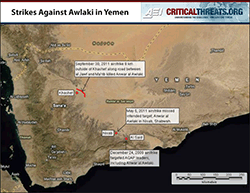{{currentView.title}}
September 30, 2011
Killing Anwar al Awlaki
Killing Awlaki will have a short-term impact on the ability of al Qaeda in the Arabian Peninsula (AQAP) to recruit foreigners and to conduct attacks against Americans. The cleric’s rise in Yemen’s al Qaeda franchise galvanized the organization’s English-language outreach. Awlaki brought with him a charismatic personality and the ability to preach radical Islamist ideas in colloquial English. He, along with Samir Khan, another American who found his way to Yemen, was responsible for AQAP’s English-language magazine, Inspire, that couples al Qaeda propaganda with how-to tips for would-be terrorists. Operationally speaking, Awlaki was extremely active in AQAP’s “far” war, its war against the West. Awlaki helped train the 2009 Christmas day bomber, Abdul Farouk Abdulmutallab, and directed him to blow up a plane over the United States. It is also believed that Awlaki was connected to the 2010 parcel plot, in which AQAP shipped bombs disguised as printer cartridges to a Chicago synagogue. Moreover, Awlaki’s writings have served to inspire others: Faisal Shahzad, the Times Square bomber, has noted as much.
 |
The broader impact of Awlaki’s death is much more limited. Awlaki was not one of the founding members of AQAP. Others such as AQAP’s leader Nasser al Wahayshi, deputy leader Said al Shihri, military commander Qasim al Raymi, and senior operative Fahd al Quso will be able to carry on AQAP’s activities without the radical cleric. Further, his death does not reduce AQAP’s hold over territory in Yemen. AQAP has a safe haven in the country that it has progressively expanded over the course of the Arab Spring. The Yemeni regime’s crisis served the terrorist organization well – al Qaeda-linked militants began to seize territory in south Yemen at the onset of the unrest and have held parts of Abyan governorate since then. Senior AQAP leaders have traveled in and out of Abyan despite an uptick in targeted drone strikes in Yemen. The increase in tempo has come from increased intelligence cooperation from the Yemeni government, and likely, increased operational activity within the core leadership. Finally, targeted killings to take out al Qaeda leaders in Yemen have not effectively halted the organization. Top leaders were killed or detained in the years following the 9/11 attacks, but al Qaeda reemerged in Yemen as the more virulent AQAP franchise.
Today’s event should be heralded as progress against al Qaeda in the Arabian Peninsula, but it will not prevent AQAP from attacking the United States and its allies over the medium and long term. The environment in Yemen has permitted al Qaeda to flourish. The Sana’a government, before the Arab Spring, faced two more threatening security challenges from an active rebellion in the north to a growing secessionist movement in the south. The unrest that spread to Yemen during the Arab Spring has only served to make the environment more permissive to AQAP and al Qaeda affiliates. Yemen’s military, never a powerful force in the country, is divided between regime supporters and opponents. Further, the regime’s distraction by the political crisis in Sana’a and the threat of civil war, served as a prime opportunity for al Qaeda-linked militants, who call themselves “Ansar al Sharia” (Supporters of Islamic law), to seize and hold territory in the south. Defeating AQAP will require a broader strategy that includes denying al Qaeda territory in Yemen.
